
Adderall addiction is a complex and chronic disease that causes social, health and economic issues for those afflicted. Even when prescribed by a doctor, individuals can succumb to substance use disorder, causing them to prioritize the drug over all other aspects of their lives.
Though a complicated disease, Adderall addiction is highly treatable. Patients can undergo treatment through residential, outpatient or partial hospitalization programs customized to meet their needs. We’ll look at the signs and potential causes of Adderall addiction and discuss treatment options if you or someone you love is struggling.
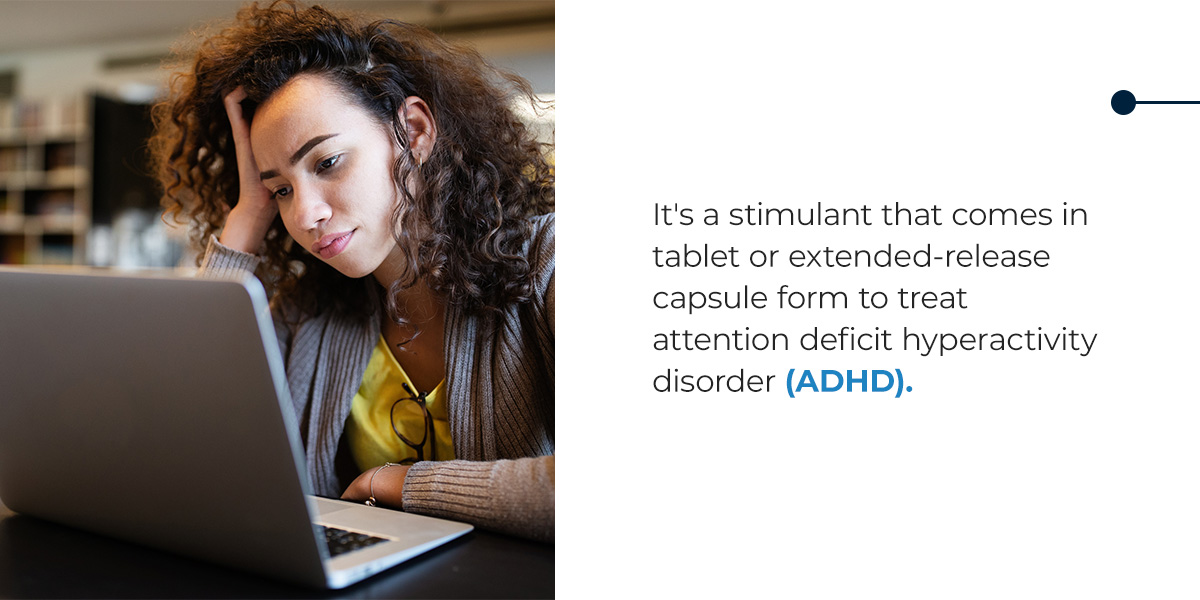
Adderall is the brand name for a medication that combines amphetamine and dextroamphetamine. It’s a stimulant that comes in tablet or extended-release capsule form to treat attention deficit hyperactivity disorder (ADHD). Adderall can help with symptoms such as:
Adderall can also treat patients with narcolepsy, a sleep disorder characterized by sudden daytime sleep attacks and excessive sleepiness.
Adderall is FDA-approved for children, adolescents and adults with ADHD to help control symptoms, though it should only be taken as directed. Some patients express that Adderall is longer-lasting than a Ritalin dose, another stimulant used for treating ADHD, and has fewer side effects as it wears off when used as directed.
The reasons for which Adderall quells ADHD impairments are still unknown. It works by increasing two brain neurotransmitters — dopamine, associated with feelings of pleasure, and norepinephrine, known as the stress hormone. The result is a stimulant that affects the central and peripheral nervous systems.
Euphoric effects are more likely to occur in those who don’t have a need for a drug, which is how this prescription medication turned into one used for illicit purposes. Because of these effects, Adderall can become highly addictive, which is why the FDA has listed Adderall as a Schedule II controlled substance alongside drugs like methamphetamine, cocaine, opium and oxycodone. Adderall isn’t synthetic and poses low health risks for those using it as directed.
Adderall use can turn habitual and lead to physical tolerance, where higher doses are required to experience the same initial effects.
By misusing Adderall, the brain becomes flooded with too much dopamine, the natural chemical that makes you feel happy and rewarded. Over time, the brain stops making dopamine, which causes cravings as individuals take more to keep those levels high. The dependency becomes so strong that the body cannot function without it.
Even when patients are prescribed Adderall, they can experience withdrawal symptoms and dependency. It’s unknown exactly why some develop substance use disorder while others do not, but a few contributing factors include:
Adderall addiction can be caused by taking the medication at higher levels than prescribed by a doctor. Patients who take Adderall for extended periods might find the drug can no longer control ADHD symptoms over time. This can make them feel like they need to take more medication to feel the effects.
Others might purposefully take Adderall in more significant amounts for a greater “high.” Overusing Adderall, however, is extremely dangerous and can lead to serious health problems. This is why doctors typically prescribe it at the lowest doses possible since when it’s used as directed, it carries a lower risk of dependency.
A prescription for Adderall usually ranges from five to 60 milligrams a day, with adolescents starting at just 10 milligrams per day. Doctors might slowly increase a patient’s dosage until their symptoms are managed.
Adderall addiction can occur by taking it:
Some people purposefully misuse Adderall for its stimulant effects. They might use it to stay up all night or boost their mental performance. While prescribed in pill form, some might snort or inject it to increase effects, increasing their likelihood of developing an addiction.
You’re also at a higher risk of developing an addiction if you take Adderall with the following medications:

Several environmental factors can lead to people developing Adderall addiction. For instance, students might use Adderall to improve their athletic or academic performance due to its stimulant qualities that help them stay awake and focused. While high school and college students experience Adderall use disorder most frequently, adults with high-stress jobs may also succumb to addiction.
Those transitioning from childhood to adulthood are at higher risk of addiction since they’re more vulnerable to stressful work and academic changes. These individuals often need extra help navigating life changes and dealing with mental or social issues. Students might turn to Adderall to help them cope with the stressors and pressures of higher education.
Anyone taking Adderall is at risk of developing an addiction. However, the following people are at higher risk:
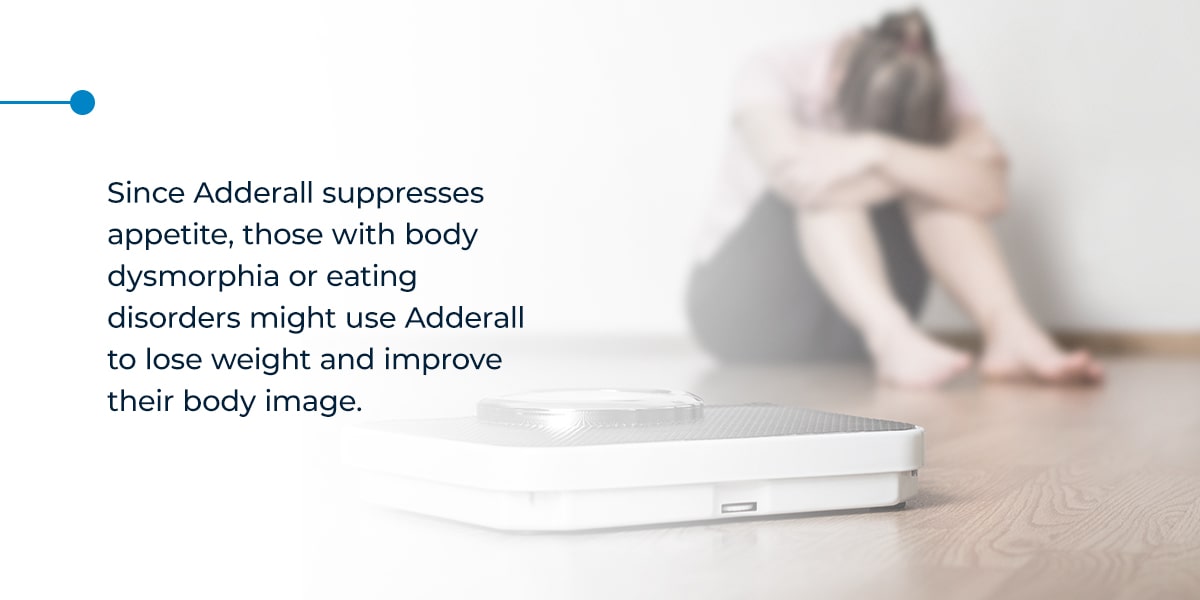
A personal history of substance use disorder, criminal activity or legal problems can increase one’s risk of developing an Adderall addiction.
Personal mental health history also plays a role in developing addiction, as young adults might feel the urge to take Adderall to cope with stress. With its stimulant qualities, some might use Adderall to give them confidence and focus, especially when dealing with anxiety.
Since Adderall suppresses appetite, those with body dysmorphia or eating disorders might use Adderall to lose weight and improve their body image. Most don’t realize Adderall is an ineffective, unsafe method of doing this. In fact, any weight lost by taking Adderall is generally not sustained over time and can quickly return once you stop taking the pills.
Additionally, heavy drug use or misuse or prior rehabilitation can increase an individual’s likelihood of developing Adderall addiction. Those who engage in risk-taking or thrill-seeking behavior might chase a similar thrill by taking Adderall.
Lastly, family history plays a role — individuals who grow up in an addicted household might normalize the misuse of substances, while genes can lead to an addictive personality.


Don’t let your addiction continue to poison your life. Start your recovery journey today.
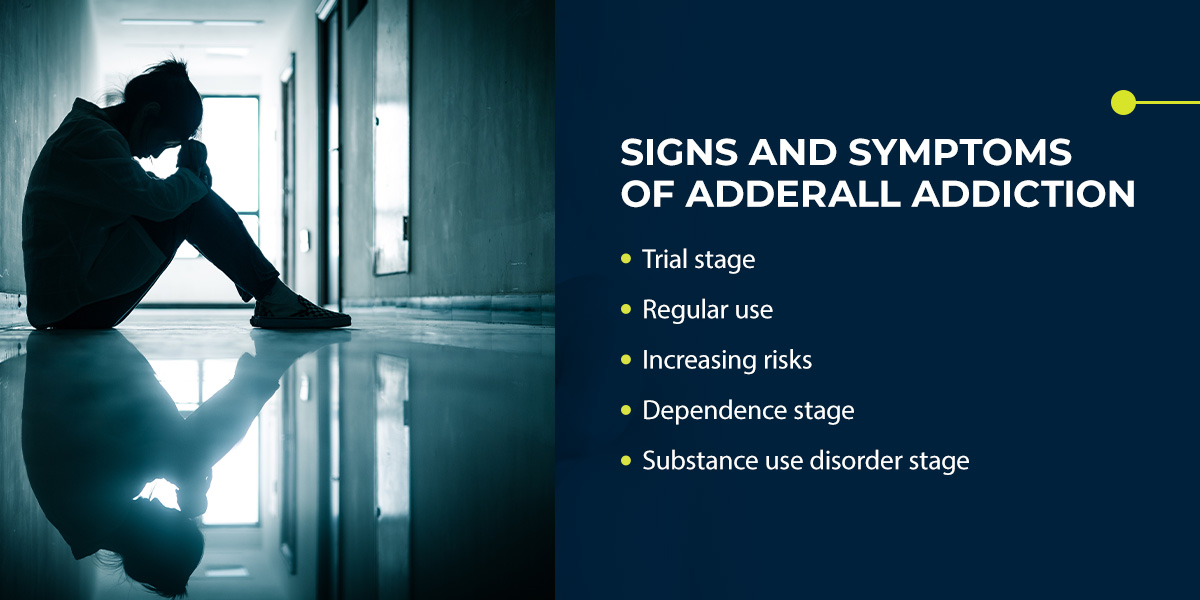
It’s essential to carefully follow the doctor’s orders when prescribed Adderall to manage ADHD symptoms. Some may misuse Adderall unknowingly and begin to prioritize getting the drug over other aspects of their lives. This can negatively impact personal and professional relationships and become an overwhelming cycle to escape.
Anyone can exhibit signs of physical dependence over time — however, some are more susceptible to addiction. Dependency is a natural and expected physiological response to the interaction of chemicals in the body. Those with natural dependency often do not display symptoms like mental obsession or craving, which is more in line with addiction.
The misuse of Adderall often occurs in five stages:
Signs and symptoms of Adderall addiction might not be evident in the early stages. Many people who misuse substances conceal their behavior to keep their drug misuse a secret. Even so, friends and family members are more likely to guide their loved ones to Adderall rehab programs.
While medical professionals can successfully diagnose Adderall addiction, there are ways to determine if you or someone you know is struggling and needs help. Identifying the signs early is vital to prevent further problems caused by addiction:
Whether intentional or not, misusing Adderall can lead to addiction. Signs of Adderall misuse include:
You’ll want to note how often your loved one takes the drug and ensure they aren’t unknowingly mixing it with alcohol or other stimulants. Adderall can produce elevated side effects like increased heart rate, jittery feelings, sleeping problems and high blood pressure when combined with alcohol. You’ll notice if they’re using more than prescribed if they run out of prescriptions earlier than expected.
The person facing addiction may want to cut down on use but don’t have the ability to do so, or they take Adderall while knowing its adverse effects. If you notice you or your loved one cannot finish work or school projects without Adderall or can’t feel alert without it, this is another sign of addiction.
Individuals with addiction will go through financial issues to supply and sustain their drug use. They’ll experience such an intense craving for Adderall that it begins to impact money, jobs and relationships. The person addicted to Adderall will take risks to obtain the drug, no matter the consequences, especially if they can no longer get their prescription drugs refilled.
If your loved one begins stealing money or spending a lot of time trying to obtain and use Adderall, they’re most likely addicted. If possible, note any financial problems such as changes in their bank accounts or credit card statements. Flag unexplained purchases and look for other signs, such as the afflicted person selling their prized possessions.
Adderall can cause people to lose weight due to its ability to suppress appetite and speed up metabolism. The drug tells the brain that a person is no longer “satisfied” or hungry, even if they haven’t eaten all day. Adderall can reduce hunger and cause individuals to feel fuller when they do eat.
A person struggling with Adderall addiction might display excessive weight loss. Watch for signs such as hollowed cheeks, baggier clothes or thinning hair from nutritional deficiencies.
Since Adderall addiction can cause extreme fatigue and exhaustion, watch for any changes in daily routines. If you or your loved one no longer has the energy to do basic daily tasks such as working, bathing or exercising, it’s most likely a sign that something is wrong. Listen to your body and note changes.
If it’s a close friend, family member or coworker you suspect may be addicted, note physical changes in their appearance. If they’ve been wearing the same clothes for days or haven’t been bathing, these are substance use disorder red flags. Take note of sluggishness and if the person neglects their daily activities.
As physical dependency from Adderall misuse changes the brain, addicted individuals might display unusual behaviors. Watch for behavioral changes such as:


Overcoming a substance use disorder is hard, but you don’t have to struggle alone. Find supportive, evidence-based treatment at Gateway Foundation.
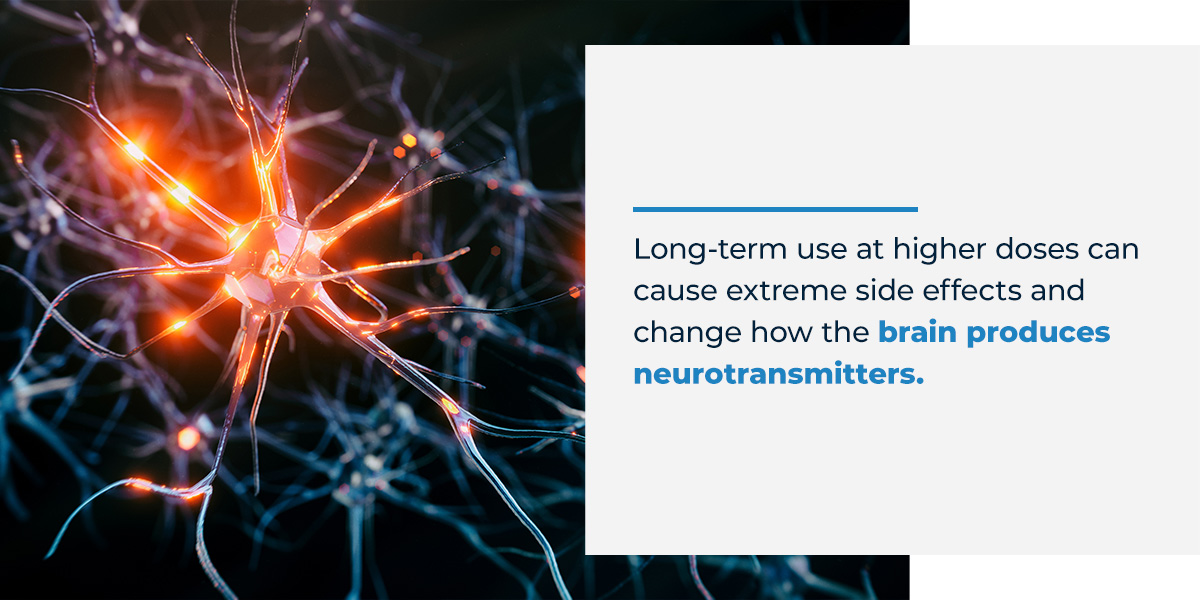
Adderall addiction develops when prolonged drug use causes health problems and failure to meet responsibilities at home, work or school. It can also affect relationships as family and friends of those struggling with addiction find it difficult to help them combat the disease.
Adderall addiction can happen to anyone, whether the drug is prescribed by a doctor or through illicit use. The effects can worsen over time as the body attempts to adapt to changes caused by addiction and requires higher dosages to get the same initial results.
Long-term use at higher doses can cause extreme side effects and change how the brain produces neurotransmitters. While these side effects may be reversed once you stop taking Adderall, it’s essential to speak with a medical professional if you experience them. Effects of Adderall addiction include:
The short-term effects of Adderall misuse can cause brain changes that may develop into long-term problems if not addressed by a medical professional. Short-term effects include:
These symptoms may vary depending on the person and their age. Most side effects go away after a week or two of using the drug, while others who take Adderall prescribed by a doctor might never experience side effects.
Short-term effects increase when mixing Adderall with other substances or taking more medication than prescribed. Heart changes and psychotic symptoms can also develop quickly and should always be addressed by a medical professional even if they dissipate.
Individuals will start taking more Adderall than usual to feel the drug’s effects as their body develops a physical dependence. This can be extremely dangerous and cause brain chemistry and function changes, digestive issues, heart damage and other harmful effects.
Mental health impacts our daily lives, relationships and physical health. When coupled with Adderall addiction, the mental health effects can be significant, even if patients were not diagnosed with depression or other mental illnesses before taking Adderall.
Some studies have shown a risk of developing psychosis when misusing Adderall for extended periods. Psychosis is a severe mental condition characterized by a person experiencing disordered thinking to the point they lose touch with reality. If left untreated, neurotoxicity can occur. This is when psychosis and schizophrenia-like symptoms caused by paranoia persist and require a lifetime of treatment. Symptoms can also present themselves when people on high dosages abruptly stop taking it or quit “cold turkey.”
Symptoms of psychosis can include:
Psychosis is one of the more severe effects of Adderall addiction that should be addressed by a medical professional right away.
Depression can also be a symptom of withdrawal. As the brain becomes used to the high levels of dopamine, a significant drop causes the brain to readjust. This readjustment period can bring strong adverse effects, such as extreme sadness and suicidal thoughts.
Misusing Adderall for extended periods can cause serious cardiovascular issues from overdoses, such as heart attacks and sudden cardiac arrest.
Using Adderall as an appetite suppressant to lose weight places a dangerous amount of stress on the heart. The same molecules in the drug that make the body tired can often jumpstart the cardiovascular system and put a person at risk of blood clots, strokes, seizures and heart failure.
Combining Adderall with alcohol can also cause severe heart problems. Since Adderall is a stimulant and alcohol is a depressant, the two substances will compete in the body, raising blood pressure and body temperature, increasing heart rate and causing an irregular heartbeat. Adderall can also dull the symptoms of being drunk. When combined, people might not know how much alcohol they’ve consumed, leading to over-drinking, risky behavior and alcohol poisoning.
It’s essential to report these symptoms to a medical professional or call emergency health services immediately.
The physical dependence on Adderall can come with uncomfortable or painful symptoms when a person attempts to quit without medical support. Withdrawal symptoms appear when the brain tries to adapt to the sudden absence of drugs.
While withdrawal doesn’t always indicate addiction, it’s beneficial to understand the signs:
Stimulant withdrawal might also make you seem hungover or intoxicated, and the risk worsens when the Adderall is misused.
The risk of Adderall overdose increases as the individual takes too much or manipulates its administration by snorting or injecting their medication. Taking Adderall with alcohol can also increase the possibility of a fatal overdose.
Depending on the frequency and dosage of the person, symptoms of an Adderall overdose can include:
It’s essential to seek emergency health care services if you or someone you know experiences the above symptoms. An overdose can be fatal if left untreated. Other severe symptoms of prolonged use, such as kidney or brain damage, can also lead to coma or death.
When a person develops an Adderall addiction, the physical and mental dependence associated with the disease can make it challenging to quit the drug. This reliance will often interfere with relationships and daily routines. It can also cause individuals to lose money, jobs and academic opportunities, which can have a profound mental effect on individuals.
Doctors can diagnose Adderall use disorder if you or someone you know is dealing with this complex disease. It might be time to seek professional help through an Adderall addiction treatment program if you:


Don’t let your substance use continue to wreak havoc on your life. Start your recovery today.
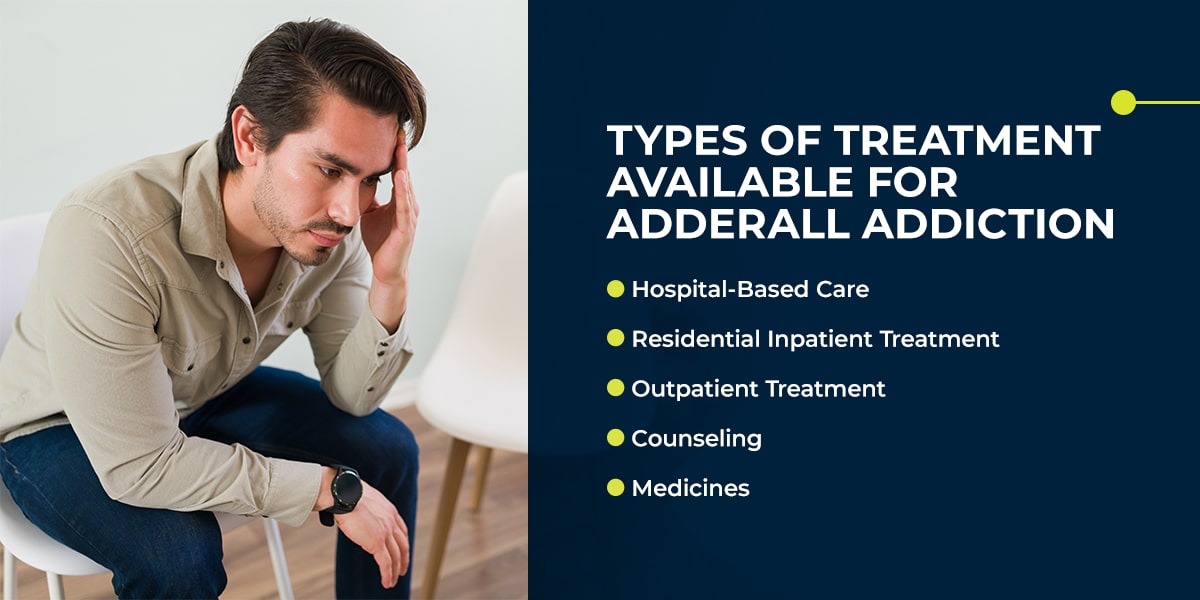
Depending on the level of care needed, people addicted to Adderall can receive treatment at a hospital, live in a treatment center or receive care while living at home.
Inpatient or partial hospitalization programs provide addiction treatment and health care services to help those struggling with substance use disorders and medical problems. Similar to residential care, hospitals can use medicines, therapy and structured plans to help patients reach sobriety.
In a residential treatment center, patients live with others struggling with addiction in a space free from situations that could provoke Adderall use. Residential treatment centers provide nutritious meals, a comfortable place to rest and sometimes exercise and other wellness activities. You’ll typically attend support groups to listen to and provide tips for your peers and receive behavioral therapy to understand the factors that contribute to or coincide with your addiction.
Unlike residential treatment,outpatient care allows patients to go to work and school and tend to other daily activities while receiving treatment. This type of treatment is suited for those with obligations such as child care or those who do not want to undergo inpatient care. Intensive outpatient programs also tend to be more affordable than inpatient or partial hospitalization programs.
Attending group therapy or individual counseling can help patients alter their attitudes and behaviors surrounding their Adderall use. Cognitive-behavioral therapy (CBT) can provide patients with an understanding of how their mental health issues impact addiction and how to build healthy habits following treatment. Group counseling can help patients achieve a sense of belonging as they confide in those with similar life struggles.
Some medicines can lessen and relieve withdrawal symptoms associated with heavy or long-term Adderall use. Medical professionals can provide a healthy taper-down approach to comfortably treat your addiction through inpatient or outpatient care. They might also use medication to treat coinciding conditions that can impact addiction, such as depression and anxiety.
The National Institute on Drug Abuse provides extensive information on substance use recovery services. The two main approaches include medication-assisted treatment (MAT) and psychotherapy.
Whether inpatient or outpatient, MAT and psychotherapy can be provided in the same treatment program as part of a comprehensive recovery plan. MAT is typically reserved to treat opioid use disorder as the FDA has yet to approve a drug that explicitly targets Adderall addiction. Detox might also occur on-site at a treatment center or in a separate facility or hospitalization program.
Early treatment can help prevent the social, physical and mental harm caused by long-term Adderall misuse. While it may be a long process for some, receiving the best care possible at a treatment center brings a stronger chance for successful recovery.
Before entering a treatment program to address addiction, medical professionals will determine whether an inpatient or outpatient program would benefit the patient. The goal of both programs is to ultimately help you reach sobriety, avoid relapse and improve your quality of life.
The process to treat Adderall addiction typically involves:
The following is a more thorough breakdown of methods employed at addiction treatment centers:
When paired with therapy, medical detox can help soothe the physical distress accompanying Adderall addiction and increase a patient’s chances of a complete recovery. Ending Adderall use abruptly is never recommended. Withdrawal can be severe for long-term or heavy users and presents significant health risks. For this reason, detox under medical supervision is recommended.
Adderall addiction withdrawal symptoms can be uncomfortable, though they’re usually not life-threatening. The severity of symptoms will depend on factors like:
Most people affected by substance use disorder will do anything to avoid withdrawal symptoms, pushing them to continue taking substances or to relapse after receiving detox. patients have a better chance of success when their Adderall dependence treatment is addressed medically and professionally.
Pairing detox with counseling and psychotherapy can help patients understand the root of their addiction and pinpoint the social, professional or academic stressors that trigger Adderall use. Trained counselors can help patients work through their stress and find healthy ways to overcome triggers.
Adderall addiction treatment programs in Illinois might involve:
Gateway was one of the best decisions of my life they truly saved me from the road I was headed down! I would love to thank the staff and of course my amazing counselor Adrain really helped me refocus my life on the right path without gateway I wouldn’t have made it thank you and I love this place I always come back to alumni meeting and events.
My family member just competed her 28 day stay she had a great experience the staff is wonderful and treated her with respect and went above and beyond to help her. Gateway saved my family members life. It was not easy finding a nice inpatient rehab and gateway made the whole process very smooth we are so thankful we found this facility. Thank you gateway.
Spent some time here and got some great tools to help me in my recovery. My counselors in the women’s unit were great and supportive. Love the monthly alumni meetings after treatment, great way to stay connected.
A little over 7 years ago I decided to seek treatment for alcohol and drug addiction and chose this facility as a place to try and arrest my disease and I have been clean and sober ever since. After 30 days inpatient treatment and 9 months outpatient I was able to achieve that goal. I recommend this facility to anyone who truly wants freedom from active addiction.
This place honestly saved my life. I was so bad my counselor said in the 2 years she was working there my case was the most unique she’s ever had, and now I’m almost 15 months clean!

Gateway was one of the best decisions of my life they truly saved me from the road I was headed down! I would love to thank the staff and of course my amazing counselor Adrain really helped me refocus my life on the right path without gateway I wouldn’t have made it thank you and I love this place I always come back to alumni meeting and events.
My family member just competed her 28 day stay she had a great experience the staff is wonderful and treated her with respect and went above and beyond to help her. Gateway saved my family members life. It was not easy finding a nice inpatient rehab and gateway made the whole process very smooth we are so thankful we found this facility. Thank you gateway.
Spent some time here and got some great tools to help me in my recovery. My counselors in the women’s unit were great and supportive. Love the monthly alumni meetings after treatment, great way to stay connected.
A little over 7 years ago I decided to seek treatment for alcohol and drug addiction and chose this facility as a place to try and arrest my disease and I have been clean and sober ever since. After 30 days inpatient treatment and 9 months outpatient I was able to achieve that goal. I recommend this facility to anyone who truly wants freedom from active addiction.
This place honestly saved my life. I was so bad my counselor said in the 2 years she was working there my case was the most unique she’s ever had, and now I’m almost 15 months clean!


Gateway Foundation offers customized, evidence-based recovery plans to support your recovery and ongoing healing.
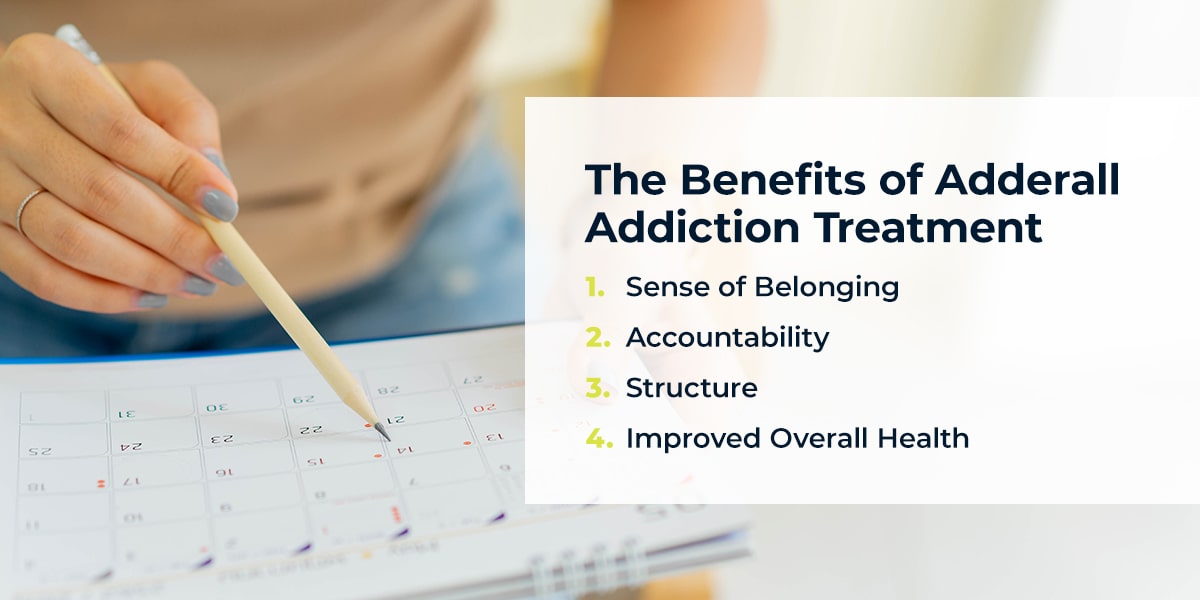
If you or a loved one suffers from Adderall addiction, know that you are not alone. Several treatment options can provide long-term care to those struggling with this disease. Following a structured path presents a high potential for patients to successfully maintain sobriety.
Let’s look into a few of the benefits of Illinois Adderall addiction help centers:
If you struggle with substance use disorder, it’s essential to have a support system to carry you through recovery. You’ll feel a sense of belonging when you enter an inpatient care center with a community of staff, counselors and fellow peers to support you on your path to recovery. You can encourage others throughout their journey and build strong relationships to help you through tough times.
Support groups allow you to discuss your recovery process with like-minded individuals and help others overcome addiction. You’ll discover tips to deal with the stressors of everyday life while filling your sobriety toolbox with healthy habits.
It’s equally essential to have people around you to hold you accountable through recovery. Therapy and support group sessions provide a judgment-free environment to discuss your problems and receive motivation to continue treatment.
You’ll have peace of mind knowing there’s always someone around to check on your needs and inspire you to overcome addiction.
Counselors and peers can offer hope through challenging times and hold you accountable to make the necessary changes for a healthier lifestyle. You might set goals or discuss aspirations and your means to achieve them with peers. Having people around you gives you a better chance of preventing relapse and continuing down a healthy path.
People struggling with substance use disorder often deal with a chaotic lifestyle and turn to drugs to cope. Adderall treatment centers prioritize structure and routine to overcome addiction. Counselors emphasize daily structure and the formation of healthy habits to help you maintain sobriety and live a healthy lifestyle post-treatment.
Treatment centers often emphasize the importance of overall physical and mental well-being. Misusing substances can cause your body to weaken and lose nutrients, making it difficult for you to perform basic everyday tasks. When you prioritize your physical and mental health at treatment centers, you have a high potential to prevent relapse and achieve a more positive mindset.
Treatment centers offer nutritious meals to help you recover and recreational activities to improve your mental and physical health. You might attend exercise classes, undergo music therapy or hike with your peers. As you work on strengthening your mind and body, you’ll gain the confidence to overcome addiction and continue making positive changes after treatment ends.
We’ll now provide answers to a few common questions we receive about Adderall addiction treatment.
Many patients will need to receive treatment several times to overcome addiction. Family and friends can play an essential role in a healthy recovery.
It’s also essential to treat both Adderall addiction and coinciding conditions such as depression or anxiety for treatment to work.
Medical professionals at Gateway Foundation might recommend and administer medications such as Vivitrol or Suboxone to aid patients through recovery. While medication isn’t a substitute for long-term care, these medicines can help patients safely and comfortably navigate withdrawal and taper down substances in their system.
There are no natural substances that mimic the effects of Adderall, though some safe, plant-based products such as magnesium and ginseng can offer calmness and focus. While these are naturally derived, it’s always essential to discuss drug interactions with a medical professional before using natural stimulants.

As you’ve learned, Adderall use disorder is a complex disease that can present various health, financial and relationship problems. Though complicated, Adderall addiction is highly treatable. If you or someone you love is struggling with addiction, Adderall addiction treatment centers in Chicago can help break the cycle.
At Gateway Foundation, we are with you for life. We foster an environment of professionality and compassion to help you get your life back on track. Our custom inpatient and outpatient programs provide the care you deserve so you can achieve successful recovery.
To learn more about our treatment plans, get in touch with us today.
Explore the latest news and resources from Gateway Foundation.


We use cookies to give you the best experience on our website. If you continue without changing your cookie settings, we assume that you consent to our use of cookies on this device. You can change your cookie settings at any time but if you do, you may lose some functionality on our website. More information can be found in our Privacy Policy.
